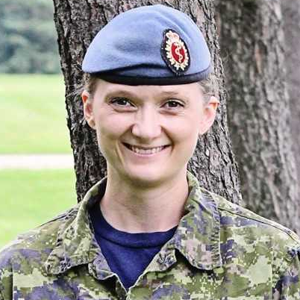Veteran Family Virtual Summit 2024: Empowering Families through knowledge, community and hope
Content warning
If you find this content difficult and it brings up a range of emotions, we encourage you to care for your safety and well-being. If you are in distress, please call or text 9-8-8. If this is an emergency, dial 9-1-1.
Join us for a meaningful conversation dedicated to sharing information, resources and inspiration about Veteran Family mental health and well-being.
Building on the success of the first-ever national summit focusing on the needs and experiences of Veteran Families, the Atlas Institute for Veterans and Families is excited to announce that we will be hosting the second annual Veteran Family Virtual Summit in January 2024.
Veteran Family Virtual Summit 2024: Post-event summary report
It is crucial to acknowledge and prioritize the needs of Family members as individuals. Often serving as the main pillar of support for Veterans living with mental health issues, Veteran Family members can experience their own challenges that are unique to this vital role that they play. As such, they deserve access to knowledge, resources and supports that speak to their specific experiences and address their needs.
This two-part virtual summit remains free to attend and will once again bring together speakers from across Canada. Hear from experts in the field who will share valuable knowledge and insights on issues of critical importance to Families of Canadian Armed Forces (CAF) and Royal Canadian Mounted Police (RCMP) Veterans, and learn from the real-life stories and experiences of Veteran Family members.
Join us for this special opportunity to connect with other Veteran Families and share ways to foster resilience, healing and hope.
Agenda

Summit host: Laryssa Lamrock

Summit host: Polliann Maher
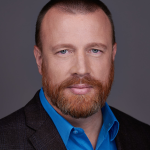
Summit emcee: Brian McKenna
National Strategic Advisor, Veterans
Atlas Institute for Veterans and Families
Family member, National Strategic Advisor, Families
Atlas Institute for Veterans and Families
Family member, Lived Expertise Lead, Families
Atlas Institute for Veterans and Families
![]() Fardous Hosseiny
Fardous Hosseiny
President and CEO
Atlas Institute for Veterans and Families
Blending lived experience accounts, fascinating corporate case studies, leading-edge research and passionate arguments that the status quo is no longer acceptable in the field of mental health, Stéphane makes us ask ourselves: How did we miss the obvious? How did we miss our people?
In this keynote, Stéphane will draw from his autobiography in which he tells his story from the day he landed in the midst of the Rwandan genocide, through his journey of changing mental health culture in the Canadian military and developing national Guidelines for Peer Support with the Mental Health Commission of Canada, to his work today. He will focus on and encourage us to reflect on how a soldier’s mental health has an effect on Family members, and share quotes from his book featuring the voice of his spouse making the case that we can and must do more for Families.
CEO, Mental Heath Innovations – Disrupter of the status quo and Veteran
Pediatric chronic pain is a prevalent, costly and rising epidemic. It is linked to chronic pain and mental health problems (e.g. PTSD, anxiety, depression, suicidality, opioid misuse) into adulthood. Pain is transmitted across generations — having a parent with chronic pain and mental health issues confers risk for chronic pain in youth. Previous research has revealed that Veterans experience chronic pain at high rates, which places their children at risk for developing pain, and that pain is impacted by military culture and identity by all Family members.
Our research has shown that military culture and identity are integral in shaping the experience of pain, not only among Veterans, but among their spouses and children. Expressing pain comes at a cost: it counters the hierarchy of “mission-men-self” and can lead to serious social, occupational and emotional ramifications, including being “cast from the herd” and being medically released. A culture of stoicism and concealing pain is fostered, as is an incredible sense of pride and resilience. Trauma and pain are integrally linked and can be transmitted across generations and within Families through neurobiological (epigenetics) and social (parenting) mechanisms. Even in the face of extreme trauma, Families can be resilient. Emerging evidence is revealing that social support and community can buffer against the risk of parental trauma on pain development in youth.
Melanie Noel will present on her translational program of research examining the intergenerational transmission of pain and trauma in Veteran Families and other Families living with chronic pain. This research is co-led by and in partnership with Veterans and their spouses and children. In addition to characterizing this issue, she will share how her team is also co-designing solutions with Veteran Families to foster resilience by harnessing their incredible and unique strengths.
![]() Melanie Noel, PhD, RPsych
Melanie Noel, PhD, RPsych
Professor of Clinical Psychology, University of Calgary
This presentation will provide an overview on how grief and bereavement are understood today. We will then explore and learn from one another how grief is carried and often overlooked in Veteran Families. Trauma and vicarious trauma will also be discussed as a potential complicating factor in grief. Strategies to assist grief and loss will be introduced.
Throughout their lives, members of the military and Veteran community experience challenges and transitions that are unique to their reality. Various losses can dot the path of these Families, such as the loss of a home, a network, a job, a friend, or physical or mental health.
This session will address the following questions: What is a transition? What is grief? What are the stages of grief?
We will shed some light on the different kinds of grief that community members may go through, with the aim of helping them better understand and care for themselves along the way, and equipping them to live with grief more gently.
Veteran Family members are often the first line of support for their loved ones living with mental health challenges. Compassion fatigue can be common when Family members have ongoing, direct contact with loved ones who are in crisis or require significant support. This panel of Veteran Family members will give voice to those who have been through this journey firsthand, sharing their lived experiences, what resources or support helped them and how they have learned to have a better life/support balance. Panel will be 50 minutes in length.
Panellists:
![]() Tabitha Beynen
Tabitha Beynen
CAF Veteran
![]() J Don Richardson
J Don Richardson
MD FRCPC, Psychiatrist
![]() Elizabeth Gough
Elizabeth Gough
Spouse of a CAF Veteran
Moderators:
![]() Laryssa Lamrock
Laryssa Lamrock
Family member, National Strategic Advisor, Families
Atlas Institute for Veterans and Families
Family member, Lived Expertise Lead, Families
Atlas Institute for Veterans and Families
Giving a voice to the Veteran and Family community, one story at a time
National Strategic Advisor, Veterans
Atlas Institute for Veterans and Families
Family member, National Strategic Advisor, Families
Atlas Institute for Veterans and Families
Family member, Lived Expertise Lead, Families
Atlas Institute for Veterans and Families
Saturday, January 27, 2024 | 11:00 a.m. – 4:30 p.m. Eastern time
National Strategic Advisor, Veterans
Atlas Institute for Veterans and Families
Family member, National Strategic Advisor, Families
Atlas Institute for Veterans and Families
Family member, Lived Expertise Lead, Families
Atlas Institute for Veterans and Families
![]() Fardous Hosseiny
Fardous Hosseiny
President and CEO
Atlas Institute for Veterans and Families
When Daphne McFee, an RCMP Veteran, searched ways to help her children understand the challenges of living with a parent with PTSD, she found little information available. Realizing that “When PTSD enters a home, everyone is impacted by it,” she embarked on a heartfelt journey that not only encompassed the highs and lows experienced by her Family, but also inspired her to write a children’s book.
Her story isn’t just about living with someone with PTSD, depression and hyper-vigilance. It is a testament to resilience, love and the collective strength of a Family.
By sharing her journey, Daphne hopes to light the path for other Families dealing with similar challenges.
![]() Daphne McFee, Sgt. (Retired)
Daphne McFee, Sgt. (Retired)
Retired RCMP Sergeant, Certified Yoga Instructor and Author
Mild TBI (a.k.a. concussion) has been called a “silent epidemic” because most people have no physical signs of injury. Mild TBI can also be silent because Veterans either do not recognize they have had an injury or assume their cognitive challenges are from PTSD. These cognitive challenges can affect every aspect of a Veteran’s daily life and can be a source of stress and burden for Families. In this session, we will discuss mild TBI effects on Family life and share practical tips to support Families in managing cognitive challenges at home.
Professor and Assistant
Dean for Speech-Language Pathology in the School of Rehabilitation Science at McMaster
At their best, close relationships with Family and friends support good mental health and stress-resiliency by providing purpose, comfort, a sense of belonging and happiness. However, for people facing operational stress injuries (OSIs), navigating the depth, emotions and demands of close relationships often becomes complicated. This presentation will outline common impacts of OSIs on close relationships, explore useful psychological frameworks for understanding these changes and share practical strategies for those with OSIs and those supporting them to move towards more fulfilling and positive connections.
We often talk about the influence of military culture on a soldier’s own identity and the imprint that persists despite the uniform being removed. This transition between the military world and civil society presents itself in the form of an identity crisis through the loss of benchmarks and means to redefine oneself. However, what about our Families, our loved ones, who live in the shadow of this same state of crisis?
“I was Colonel Brookman’s wife, I had status! Who am I now?”
Together, we will address this idea of redefining our roles as a Family.
For both those who don the RCMP uniform and their loved ones, there is often a tangible impact of the dedication needed to serve Canadian communities. Many RCMP Veteran Families go through their own unique challenges and experiences while standing alongside those they love – a form of service in its own right.This panel of RCMP Veteran Family members will share the lived experiences of that special strength and courage, with participants talking about how knowledge, community and hope has played a significant role in their journeys.
Panellists:
![]() Maddison Kelly
Maddison Kelly
RCMP Adult Child
Moderators:
![]() Laryssa Lamrock
Laryssa Lamrock
Family member, National Strategic Advisor, Families
Atlas Institute for Veterans and Families
Family member, Lived Expertise Lead, Families
Atlas Institute for Veterans and Families
Giving a voice to the Veteran and Family community, one story at a time
National Strategic Advisor, Veterans
Atlas Institute for Veterans and Families
Family member, National Strategic Advisor, Families
Atlas Institute for Veterans and Families
Family member, Lived Expertise Lead, Families
Atlas Institute for Veterans and Families
NOTE: Clinical Support will be available throughout the Summit.
Bios
Brian McKenna
Brian McKenna served for 19 years in the Canadian Army, retiring as a Warrant Officer. In that time, he served in Bosnia twice, both as a signaller and then a section commander. Brian then deployed to Afghanistan twice, once with the Canadian Army and once again as a NATO counter-improvised explosive device instructor. While seeking medical treatment post-release, Brian joined with other Veterans in petitioning the government for the creation of a centre focused on Veteran and Family mental health issues, resulting in the establishment of the Atlas Institute. Brian currently serves as National Strategic Advisor, Veterans, for the Atlas Institute.
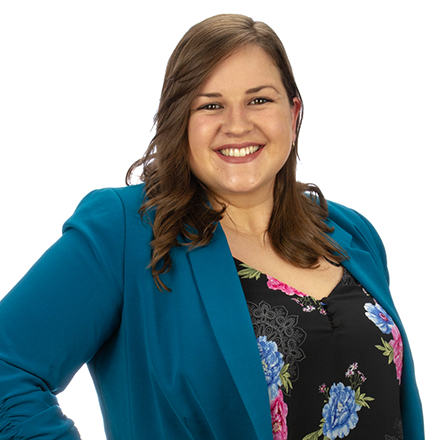
Christina Harrington
Christina holds a PhD in social work and has practised in clinical roles for more than 20 years. She began her career in community and hospital-based mental health programs and later practised in critical care at a regional trauma centre.
Christina moved into private practice in 2009. She owns and is the Director of Social Work Solutions Canada in Hamilton, Ont. The practice offers an array of mental health services and treatment modalities. In this role, she also provides supervision to other social workers.
Christina enjoys opportunities to teach as sessional faculty and currently is working with Dalhousie University in Halifax, N.S.
Academia feeds her nerdy side and she enjoys research, publishing and serving as a peer reviewer for international journals in death, dying and bereavement.
Christina’s doctoral dissertation focused on the bereavement experiences of Family members of our fallen heroes in Afghanistan.
For Christina, working with front-line and first-response roles is near and dear to her heart. She was raised in a military Family where her dad doubled as a part-time volunteer firefighter and her mother was a nurse. Christina is now proud to be part of a police Family.
Outside of work, Family is very important to her. She spends much of her time keeping up with her fiancé and their many children.

Daphne McFee
Daphne McFee is a retired RCMP sergeant who has spent most of her career within national security threat assessment and investigations. She joined the RCMP in 1986 and was released on a medical discharge in 2015. Daphne is a certified yoga teacher, poet and published author of two children’s books. Her second book, It’s Not Cuz of Me, focuses on helping children understand PTSD and facilitating discussions within the Family unit. When her own husband was diagnosed with severe PTSD, she realized that there was little to nothing out there to help their four children understand what was happening. This is ultimately what led her to create the story.
Daphne’s interests include writing, drawing, painting, swimming and walking her dog. She and her husband Paul have been together for 28 years and reside in Ottawa. They enjoy travelling and spending quality time with Family, especially with their young granddaughter.

Elizabeth Gough
Elizabeth Gough is a spouse of a CAF reservist. Her husband, Andrew Gough CD, is a member of the military police/Close Protection Operator and medically retired police sergeant with the London Police Service. In 2019, they founded V-EH! Veterans and Everyday Heroes, a federal not-for-profit organization. They have spoken on their journey through an OSI to offer their reflections on posttraumatic growth (PTG).
Professionally, Elizabeth is an Early Years Advisor with the Ontario Ministry of Education. She is also a dedicated community volunteer and a leader in several initiatives that champion sport, children and women’s causes. Elizabeth and Andrew have two teenage children and reside in St. Thomas, Ont.

Fardous Hosseiny
Fardous Hosseiny (he/him) is the President and CEO at the Atlas Institute for Veterans and Families (formerly the Centre of Excellence on PTSD), located at the Royal Ottawa Mental Health Centre in Ottawa.
Before coming to Atlas, Fardous was most recently the interim National Chief Executive Officer and the National Director of Research and Public Policy, at the Canadian Mental Health Association.
His research work focuses on strategic policy issues related to mental health system transformation, parity legislation, Veteran and their Families mental health, substance use and addiction and mental health for newcomers and underrepresented groups. Fardous is also a frequent commentator on these issues for Global News, CBC, CTV News, The Globe and Mail, The Toronto Star, among others.
Fardous was a part of the Canadian delegation to the 73rd Session of the United Nations General Assembly and played a role in the development of the first ever United Nations event dedicated to mental health.
Fardous also serves on many national and international committees, including as a member of the Five Eyes Mental Health Research and Innovation Collaboration, an executive advisor on the Global Alliance for Mental Health Advocates (GAMHA), co-chair of the Research Reference Group at Atlas Institute and past co-chair for the Canadian Alliance for Mental Illness and Mental Health (CAMIMH) and Canadians for Equitable Access to Depression Medication (CEADM).
Fardous is a clinical investigator at the University of Ottawa Institute of Mental Health Research.
Fardous completed a Master of Science with a focus on the neuroscience of addiction and a BSc Honours, both at the University of Toronto. He also holds a Certified Health Executive (CHE) designation from the Canadian College of Health Leaders.
Fardous is on the Board of Directors – Canadian Juries Commission and Renascent Addiction Treatment Centre.
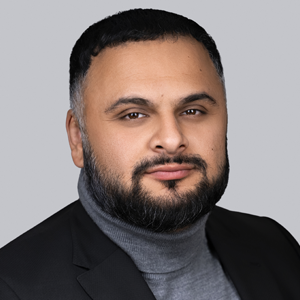
Hélène Le Scelleur
Captain (Ret’d) Hélène Le Scelleur enlisted in the CAF in March 1990 when she was only 17 years old. She joined the first female cohort in the infantry trade at the Régiment de Maisonneuve in Montreal. Hélène’s love for service to her country led her to join the Regular Forces in 1999 where she served a further 17 years, primarily as a health care administrator. During her long career, Hélène has had numerous assignments and deployments, notably in the former Yugoslavia on two occasions and in Afghanistan between 2007 and 2008.
Due to the recognition of her work in Afghanistan, Hélène received a commendation from the Commander of the Expeditionary Forces Command and was also chosen to become the aide-de-camp to the former governor general of Canada, the Right Honourable Michaëlle Jean. Sadly, Hélène’s career came to an end in 2016 following a diagnosis of posttraumatic stress disorder linked to her last mission in Afghanistan. Deciding not to give up in the face of this irreversible decision, she pledged to pursue doctoral studies with the aim of finding new solutions to deal with the identity crisis that follows the transition to post-service life for military personnel living with an operational stress injury.
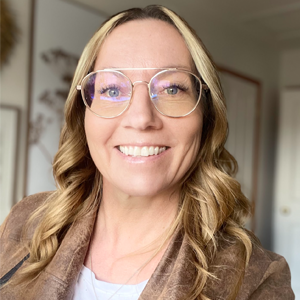
J Don Richardson
J Don Richardson is a psychiatrist and a professor in the Department of Psychiatry at Western University. He serves as the Medical Director of
St. Joseph’s Health Care London’s Operational Stress Injury Clinic in London, Ont. and the Scientific Director at the MacDonald Franklin OSI Research Centre at the Parkwood Institute. He is the Medical Advisor for the Atlas Institute. He holds a fellowship with the Canadian Institute for Military and Veteran Health Research (CIMVHR). For more than 25 years, he has been a clinician-researcher and educator, with more than 90 peer-reviewed articles and chapters focusing on military and Veteran health.

Jeanette Slater-Norminton
Jeanette Slater is the wife of a Veteran and the mother of a Veteran, both of whom served with the Royal Canadian Navy. Jeanette was born and raised in Nova Scotia, moving to Ontario where she worked with adolescents and young adults in the secondary school system. After many years of helping her son through his diagnosis and treatment of PTSD, Jeanette lost her son tragically in 2018 in a vehicle accident. She will share how she and her Family are learning to read this unfamiliar map that is their new navigation, reminding each other that grief is not a solitary journey.
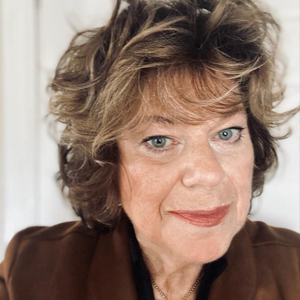
Jim Wong
Staff Sergeant (Ret’d) Jim Wong considers himself fortunate to have realized his dream of becoming an RCMP officer. He retired as a Detachment Commander after completing 37 years of service, which encompassed both uniformed and plainclothes duties, primarily in Alberta and Ontario.
Currently residing in Alberta, Jim is part of a blended Family, raising four boys and now enjoying the company of four grandchildren – three boys and one girl. After retiring from the RCMP, he embarked on a 13-year career as a Security Consultant before transitioning into the oil and gas sector, from which he recently retired.
Jim’s passion lies in ensuring that all Canadian Veterans and their Families have easy access to the assistance they need. He is committed to making this support readily available, as he understands that Veterans and their Families often hesitate to seek help, resulting in them silently suffering.
Jim is dedicated to changing this attitude, ensuring that our Veterans and their Families receive the support they deserve.
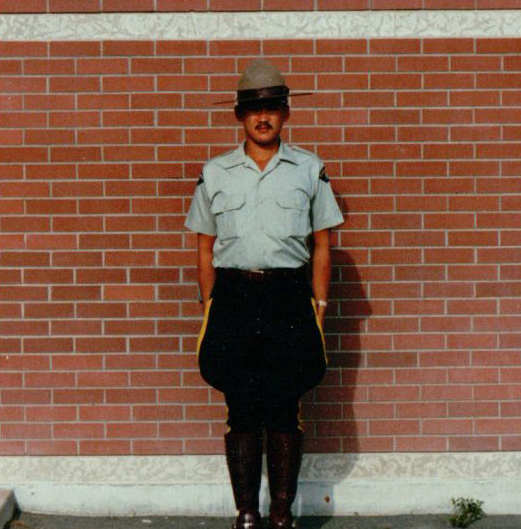
Kevin Capobianco
Kevin Capobianco earned his PhD in clinical psychology at the University of Waterloo. He has experience assessing and treating PTSD and other mental health challenges in hospitals, operational stress injury (OSI) clinics and other outpatient clinic settings. He finds working with first responders, CAF members and their Families particularly rewarding.
He integrates various psychotherapeutic techniques in his clinical work to tailor his approach to fit the needs of each client. He strongly believes in the value of sharing scientific and clinical insights from psychology with those outside the profession through outreach events.

Laryssa Lamrock
Laryssa Lamrock is the National Strategic Advisor for Families at the Atlas Institute for Veterans and Families. She has a unique blend of experiences in nursing and military Family deployment support. In addition, she has extensive knowledge and expertise in the field of peer support as well as lived experience as the spouse of a Veteran living with PTSD. She is also the daughter and mother of military members. Laryssa draws from these experiences as she advocates passionately for and represents the voices of military and Veteran Family members.
After 12 rewarding years with the Operational Stress Injury Social Support (OSISS) program, Laryssa believes strongly in the importance of Family involvement in the recovery process. It can improve the prognosis of mental health issues and have positive impacts on Family functioning and wellness. She feels many more services and programs can be developed and made accessible to those supporting those who serve and have served in the Canadian military, particularly parents and adult children of Veterans.
Her work has provided her with numerous outreach opportunities, including speaking engagements at the National Conference on PTSD, an appearance before the House of Commons Standing Committee on Veterans Affairs, and at the Canadian Embassy in Washington, D.C. She serves on a number of committees, including the MacDonald Franklin OSI Research Advisory Council and the VAC Ministerial Advisory on Families. She is the author of the article “Loving a Broken Soul – The lived experience perspective on the implications of Veterans’ moral injuries for Families,” published in the Journal of Military, Veteran and Family Health. Laryssa has also co-developed and co-facilitated a series of OSI Family workshops.
Recently, her focus has also broadened to include first responders and their Families — an impassioned interest as her son is a first responder. She is driven to help identify the gaps and share lessons learned from the military and Veteran community. Laryssa has realized that it doesn’t matter what uniform you or your loved one wears.
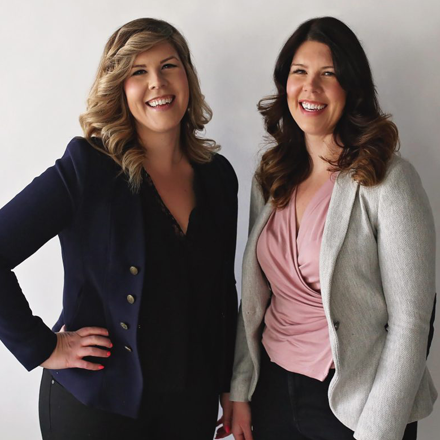
Lyn S. Turkstra
Lyn S. Turkstra, PhD, CCC-SLP, BC-NCD(A) is a professor and Assistant Dean for Speech-Language Pathology in the School of Rehabilitation Sciences at McMaster University. Her research focuses on effects of traumatic brain injury (TBI) on cognition and communication. She is co-author of international practice guidelines for TBI rehabilitation and is a TBI subject matter expert for the U.S. Department of Defense and Veterans Health System.
She and Jackie Bosch, PhD, Assistant Dean for Occupational Therapy at McMaster, are leading a clinical trial of cognitive rehabilitation for Veterans with mild TBI, in collaboration with the Atlas Institute.
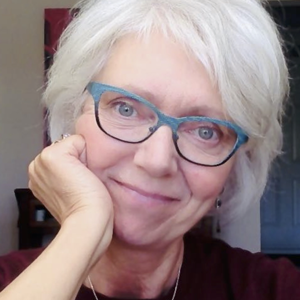


Maddison Kelly
Maddison Kelly grew up in southern Alberta, where her father was an RCMP officer in Gleichen and Strathmore. This childhood experience, deeply influenced by her parent’s role in law enforcement, significantly shaped her character and career path.
Currently employed at a children’s hospital in Alberta, Maddison has directly observed the challenges associated with PTSD, particularly through her father’s experiences, as well as the mental health issues faced by frontline workers.
Her father’s dedication to helping others, regardless of the scale, deeply inspired her.
She is thrilled to be part of this panel, embracing it as a means to continue her father’s legacy and to share the collective story of her and her father.
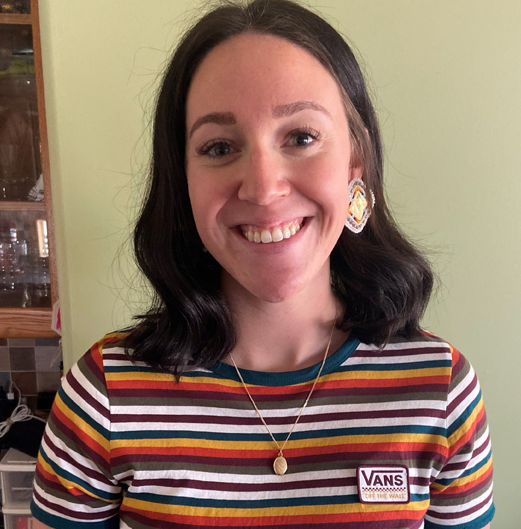


Marie-Eve Genest
Marie-Eve Genest, GC, Veteran Family Program Coordinator / Valcartier MFRC Psychosocial Services Manager
With a bachelor’s degree in psychology and a master’s in guidance counselling, Marie-Eve Genest has nearly 20 years’ experience in psychosocial intervention, mainly in community organizations. Over the years, she has worked with women who have experienced domestic violence, supported young adults with employability issues and managed projects regarding the status of women.
Having joined the Valcartier Military Family Resource Centre in 2015 as a Guidance Counsellor, she then had the privilege of being responsible for setting up and developing the Veteran Family Program from the very beginning of its pilot phase. She continues to work with Veteran Families as well as taking on an assignment as Psychosocial Services Manager, making her the right-hand person for the Valcartier MFRC’s Psychosocial Intervention Sector Coordinator.
Marie-Eve is a mother of two children aged 10 and 12, whose father is an active military member. Her past experience as a military spouse sparked Marie-Eve’s interest in supporting members of the military and Veteran community.
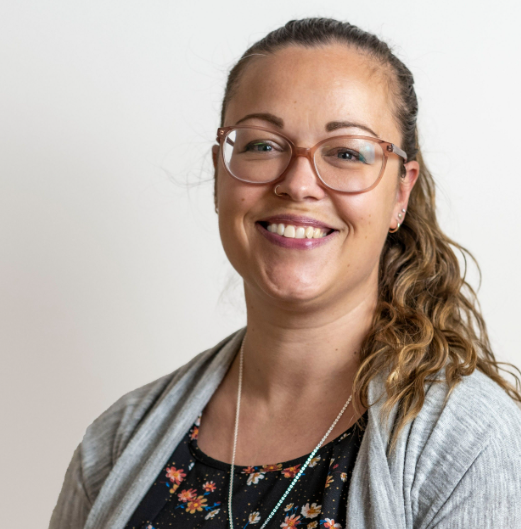


Melanie Noel
Melanie Noel, PhD, RPsych is a professor of clinical psychology at the University of Calgary and a full member of the Alberta Children’s Hospital Research Institute and the Hotchkiss Brain Institute. She directs the PEAK (Pain Education, Advocacy, Knowledge) Research Laboratory within the Vi Riddell Children’s Pain and Rehabilitation Centre at the Alberta Children’s Hospital.
Her expertise is on children’s memories for pain and co-occurring mental health issues and pediatric chronic pain. She has published guiding conceptual models of children’s pain memory development, co-occurring PTSD and chronic pain, and fear-avoidance in 183 peer-reviewed publications.
She is passionate about partnering with people with lived experience to transform how we understand and treat people with pain. She is an advocate for the use of developmentally tailored interventions for pediatric pain management and serves on committees to promote and implement evidence-based interventions within her children’s hospital and beyond. As an evidence lead on the Help Eliminate Pain in Kids & Adults team, she co-authored clinical practice guidelines on pain and fear management for vaccine injections. Many of these recommendations were adopted by the World Health Organization.



Paul Woods
Corporal (Ret’d) L. Paul Woods has served on a variety of units including general duty, the Emergency Response Team, Emergency Medical Response Team and peacekeeping operations, retiring with 35 years’ service in the RCMP. Paul was also a Reservist. He was awarded the Meritorious Service Medal in June 1999 for his response to a mass casualty event while on the United Nations advance team mission to Haiti in 1994.
His time in uniform however left lasting injuries. Two specific events while in Haiti led to being diagnosed with severe posttraumatic stress disorder (PTSD) and depression. As a result of his operational stress injuries (OSIs), he wanted to help others who are also suffering. Paul has been a longtime peer support volunteer, helping both RCMP and CAF Veterans with OSIs. Paul speaks openly in an effort to break the stigma. He is now the longest-serving peer support volunteer with Operational Stress Injury Social Support (OSISS) since it began under LCol (Ret’d) Stéphane Grenier, to whom he owes a great debt of thanks.
Paul has been married for more than 25 year to RCMP Sergeant (Ret’d) Daphne McFee. They have raised an extended Family with four children who are now adults. On his path through PTSD treatment and peer support, Paul realized that his Family also live with the impact of PTSD and needed support. This became the reason in part for his wife to write a children’s book on the questions that their own kids asked about PTSD.
He continues to provide support to anyone in need. As he says, “To leave no one in the hurt locker.”



Polliann Maher
Polliann Maher is the Lived Expertise Lead, Families with the Atlas Institute for Veterans and Families. She is the spouse of a Veteran with PTSD and brings more than 20 years of lived experience navigating the mental health system to her role. She has a background in community service work, earned by returning to school through the Veteran Affairs Rehabilitation Services and Vocational Assistance Program in 2009. Polliann spent slightly more than 10 years providing peer support to Family members with the Operational Stress Injury Social Support (OSISS) program as a Family Peer Support Coordinator in southwestern Ontario. This experience allowed her to utilize her own lived experience and her understanding and knowledge of mental health to help peers navigate the systems that can be so overwhelming to many Family members. She was instrumental in the planning and executing of online opportunities for Family members during the pandemic with a psychoeducational webinar series through the OSISS program. Polliann is passionate about educating the Veteran community and sharing her knowledge of the resources that are available to them. She is a strong advocate around changes that encompass the Family, which are many times forgotten or an afterthought.
Polliann has also served on several committees, including the MacDonald Franklin OSI Research Advisory Council, and the Board of Directors with the Southwestern Ontario Military Family Resource Centre (MFRC). She is the co-author of the article “Coping as a spouse of a military Veteran with Post-Traumatic Stress Disorder (PTSD) during the COVID-19 pandemic,” published in the Journal of Military, Veteran and Family Health. Polliann has also developed and co-facilitated a series of OSI Family workshops with the Parkwood OSI clinic.
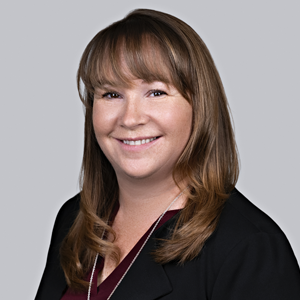
Sandy Phillips
Sandy Phillips is the wife of a medically retired RCMP officer who released due to severe PTSD. She is a mother of two and an educational assistant. Sandy continues to advocate, support and manage services for her husband while learning to cope with his OSI. Since she knows how challenging these situations are to navigate while dealing with mental health injuries, Sandy has made efforts to assist other first responders in need. The Family lives in southwestern Manitoba.
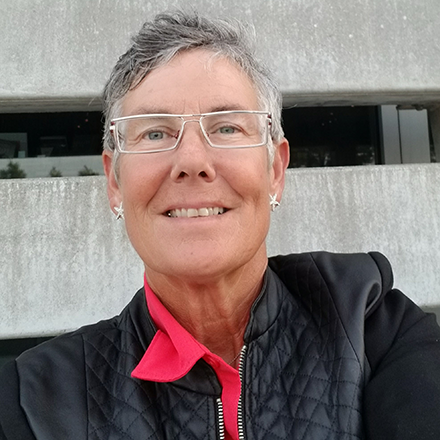

Stéphane Grenier
When it comes to mental health, Stéphane Grenier walks the talk.
Indeed, Stéphane’s riveting keynotes are not only thought-provoking, but also lead to tangible action and sustainable change for those leaders who are prepared to rethink how they support their people.
He was appointed to the Order of Canada and awarded an honorary Doctor of Laws degree by the University of Guelph and Humber College for his contributions to the field of workplace mental health.
His autobiography, After the War: Surviving PTSD and Changing Mental Health Culture, tells his story from the day he landed in the midst of the Rwandan genocide, through his journey of changing mental health culture in the Canadian military, developing national Guidelines for Peer Support with the Mental Health Commission of Canada, all the way to creating Mental Health Innovations (MHI); a consultancy that leads innovative and sustainable change in organizations to enhance the mental health of their people.
Today, he and his business partners, along with countless associates, develop non-clinical mental health interventions as a complement to traditional clinical care for private and public sector organizations, as well as for provincial healthcare systems.
Stéphane’s vision is a world where people no longer face barriers to good mental health.
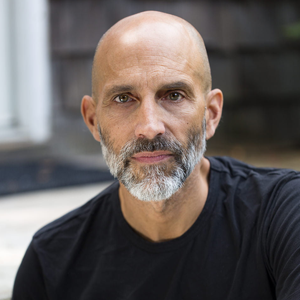

Tabitha Beynen
Tabitha is a retired master corporal who served as a CAF medic. Her story of her experience with PTSD highlights the unique struggles related to women’s mental health, being in survival mode, numbness and learning to live again with feelings and emotions.
